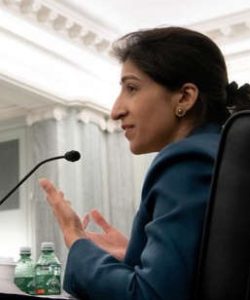 One of Big Tech’s most vocal critics now runs the Federal Trade Commission, the federal that oversees corporate mergers and exercises regulatory power over anti-competitive behavior, and that may be a harbinger of things to come.
One of Big Tech’s most vocal critics now runs the Federal Trade Commission, the federal that oversees corporate mergers and exercises regulatory power over anti-competitive behavior, and that may be a harbinger of things to come.
Lina Khan (photo), a Columbia law professor Vox calls “an antitrust law expert and a major critic of Big Tech’s power,” was named chair of Biden’s Federal Trade Commission immediately after being confirmed to a seat on the FTC with votes from senators of both parties on Tuesday, June 15, 2021.
“Khan’s appointment as FTC chair signals that, under President Biden, the FTC is likely to become more critical and aggressive in regulating the digital markets that have been created by the tech giants,” Vox says, and she’s just one of a “growing number of Big Tech critics joining the Biden administration and pushing Washington to change its approach to large technology companies.”
Polls show “most Americans think Big Tech companies should be broken up,” and there’s “growing consensus” in Congress within both parties that “companies like Google and Amazon have become too powerful.”
Khan helped write a report for Congress that concluded “Apple, Facebook, Google, and Amazon had engaged in anti-competitive behavior.” She contends existing antitrust laws aren’t “capable of addressing the harm caused by dominant platforms,” and argues that Congress should pass new antitrust legislation. That’s likely to get a sympathetic hearing on Capitol Hill.
“Exactly how the FTC might change with Khan on board remains to be seen,” Vox says. “But her joining the agency just as Congress takes up antitrust reform seems to signal trouble on the horizon for Big Tech.”
However, Khan and her fellow travelers aren’t without critics, and MSN says legislatively-mandated company breakups “could be a bridge too far for some Republican lawmakers.” (Note, however, that MSN is run by Microsoft, a big-tech company; and the 68 Senate votes for Khan’s confirmation was well over the filibuster threshold.)
They should be broken up or treated as public trusts. You know public utilities.
Utilities are regulated monopolies, and most are private companies, not public trusts.